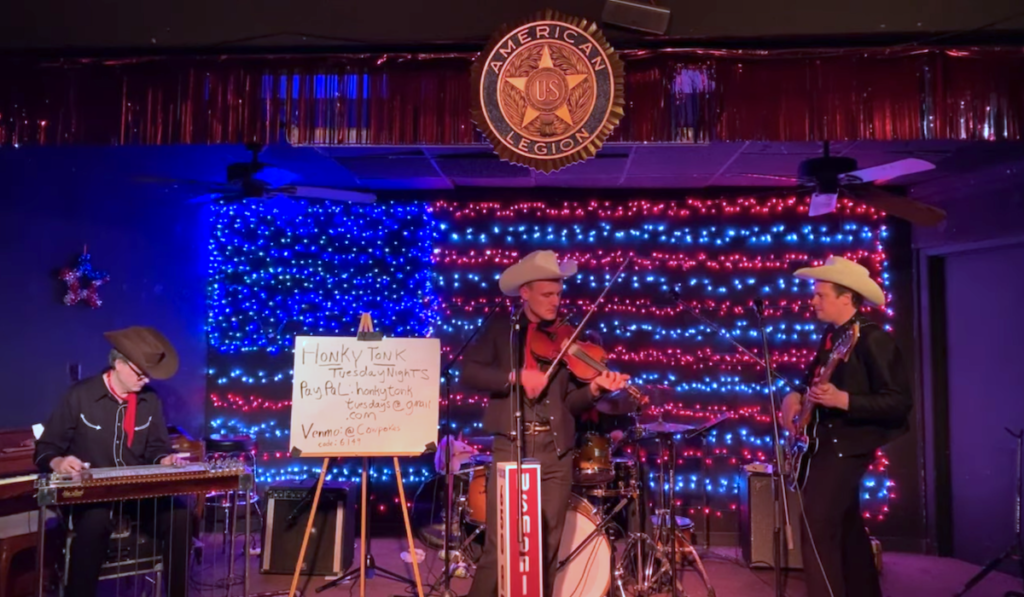
What started as a creative outlet for Nashville musicians in quarantine is now becoming one of the only ways that artists can make money or connect with fans: livestreaming concerts.
It’s a temporary Band-Aid, musicians say — but still far less than what they would have made in a normal spring of touring and playing shows.
More: The Music Is Still Playing In Nashville — At Least Online
In early March, Ansley Dougherty watched with dismay as her tour dates fell apart. Bands started canceling, then the music venues. She realized she needed a backup plan, so she turned to Facebook Live.
“Especially for me, having to cancel shows, this was a good idea to … at least bring some kind of live performance to the crowds that weren’t able to come out,” she says.
Dougherty had “zero experience” with livestreaming before, but she did her research, bought a cheap mic online and set up a keyboard in front of her couch. Then, she asked people to donate to her “digital tip jar” by sending her money on Venmo or PayPal.
And she deemed the experiment a success: She says her fans were generous, and she made about as much money as she would have at a single stop on her tour.
But that doesn’t mean it’s a sustainable business model.
“You know, the first time you do anything, it’s pretty novel,” Dougherty says. “But that novelty might wear off over time, especially with a lot of us artists doing this streaming and just how saturated it might seem.”
Sifting Through Streams
Saturation is an issue. On any given night now, you can find more Nashville musicians livestreaming shows than you could possibly watch, and not just up-and-comers.
There was Garth Brooks and Trisha Yearwood playing on Facebook. The Grand Ole Opry’s weekly iconic showcase. For a few days, Robert’s Western World was even hosting bands at its shuttered iconic honky-tonk, though it’s now sharing videos of bands playing in their homes.
For lesser-known musicians, though, it’s hard to gain momentum on virtual shows alone. Taylor Esche, a music publicist, says that’s because artists can’t attract many new fans just by playing on their own social media.
“They only have so many people they can reach. Typically, artists only have X amount of followers on their actual page,” she says.
In other words, there’s a certain kind of serendipity that comes from an IRL show: that moment where you just wander in and discover an amazing Nashville musician you’ve never heard of. Esche and a team of music industry workers are trying to capture this magic what they’re calling VirtualFestival, a one-stop Facebook page that showcases their picks for livestreamed concerts.
The Nashville Convention and Visitor’s Corporation is doing something similar, compiling a list of upcoming shows on their tourism website, “Music City Bandwidth.”
“We need to show our visitors, if they can’t come to Music City, we’re going to bring Music City to them,” says Deana Ivey, who oversees sales and marketing for the CVC. “And hopefully have that ache to come here as soon as they can get out of their houses.”
The tourism bureau is playing the long game. And so are musicians. Taylor Esche, the publicist, says ultimately those who livestream now are going to have an advantage when this is all over. They’ll be comfortable with this technology and can use it, as part of their business. But she knows that in the short term, it’s not going to make up for a lost season of touring.
“I don’t think that will ever be fully recovered by virtual festivals and by livestreaming, but I do think that this will hopefully be able to assist … to where they are able to afford groceries and they are able to pay their rent,” Esche says.
‘We Will Have Had A Good Time’
Minimal income is about all Kevin Martin can hope for right now. He’s part of a country and western band called the Cowpokes, which plays three or four times a week.
“Now down to zero,” he says. Plus, there was a tour in place with another band that would have been his primary income for the season.
One of the Cowpokes’ weekly gigs is HonkyTonk Tuesday at the American Legion in East Nashville, where the band dresses up in all-black Western suits, red ties and impressive cowboy hats. Normally there’s a dance floor filled with two-stepping couples, but now on Tuesdays, they just have to imagine their audience as they play to an empty hall.
Martin says the decision to go virtual was only partly about the money. He knows it’s not just musicians who are stressed out right now, and he wanted this multiyear tradition to continue to bring people an escape for an evening.
Plus, he wanted his regular gig back.
“Me sitting and home and doing nothing is a lot worse than me getting out and playing with just a couple of friends,” he says. “And if $10 is all anyone walks away with, that ain’t great, but we will have had a good time.”

